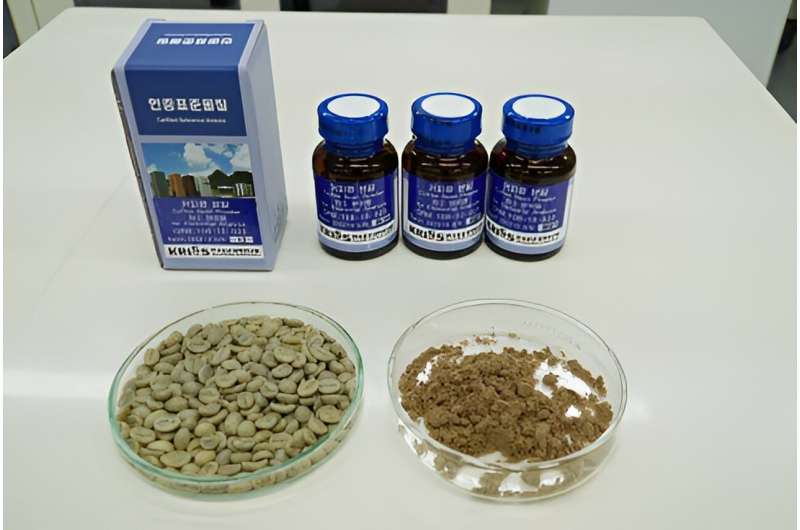This article has been reviewed according to Science X's editorial process and policies. Editors have highlighted the following attributes while ensuring the content's credibility:
fact-checked
peer-reviewed publication
trusted source
proofread
World's first coffee bean Certified Reference Material for component analysis

The Korea Research Institute of Standards and Science (KRISS) has developed the world's first Certified Reference Material (CRM) capable of accurate measurement of the nutritional and harmful elements in coffee beans.
A CRM, which provides accurate measurement values certified by an authoritative body, serves as a standard, providing a reference for verifying the accuracy of measurement results and analysis methods. The newly developed coffee bean CRM allows for the accurate measurement of five nutritional elements (calcium, magnesium, iron, zinc, copper) and three harmful elements (lead, mercury, cadmium) within coffee beans.
According to domestic regulations, the permissible limit for the total lead content in roasted coffee, instant coffee, and other coffee products is 2 mg/kg or less. In Europe, the cadmium content in dried edible coffee beans is regulated to be 0.05 mg/kg or less, and the lead content is restricted to 1 mg/kg or less. The lead, mercury, and cadmium content in this CRM are all approximately 0.1 mg/kg, which meets the standards for both domestic and European regulations.
To develop this CRM, the Inorganic Metrology Group at KRISS freeze-dried a large number of raw coffee beans and obtained a homogeneous sample through multiple grinding and mixing processes. The sample was then sterilized through irradiation, producing a CRM with outstanding stability and homogeneity.
To provide certified measurement values with the world's highest level of accuracy, this CRM employs isotope dilution mass spectrometry for measurement, one of the most reliable measurement methods in the field of chemistry. With this method, KRISS achieved an accuracy that is more than three times better than that of the conventional measurement methods used by food testing institutions.
While coffee is widely favored with a substantial volume of international trade, a CRM for elemental analysis of coffee beans, allowing their quality control, has been absent. The newly developed coffee bean CRM by KRISS, however, is expected not only to enhance the measurement reliability and evaluation system of domestic food testing institutions but also to contribute to various fundamental coffee-related research through international collaboration such as overseas distribution.
Dr. Kyoung Seok Lee, the director of the Division of Chemical and Biological Metrology, said, "This achievement represents a technological advancement that can significantly improve the quality control level of coffee, a popular beverage as well as a heavily imported product. KRISS will continue to develop CRMs for foods such as Korean cabbage, blueberry, and pork so as to make a healthy and safe dining table for the nation."
The paper is published in the journal Analytical and Bioanalytical Chemistry.
More information: Jong Wha Lee et al, Development of a coffee bean certified reference material (KRISS CRM 108-10-023) for elemental analysis, Analytical and Bioanalytical Chemistry (2023). DOI: 10.1007/s00216-023-05051-5
Journal information: Analytical and Bioanalytical Chemistry





















